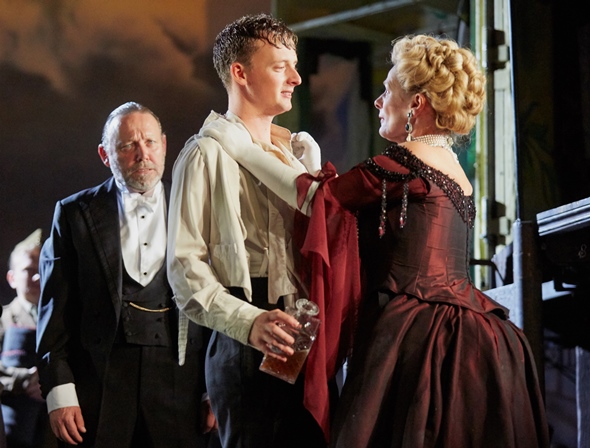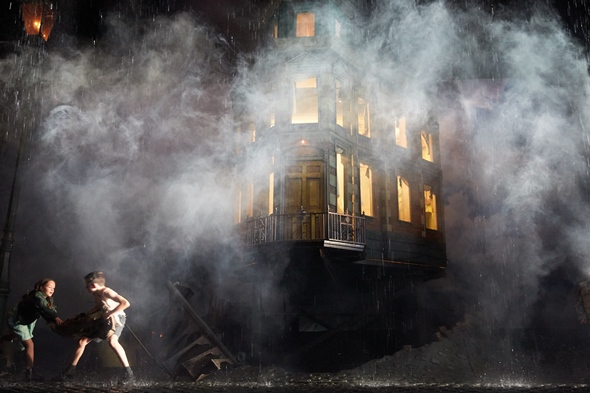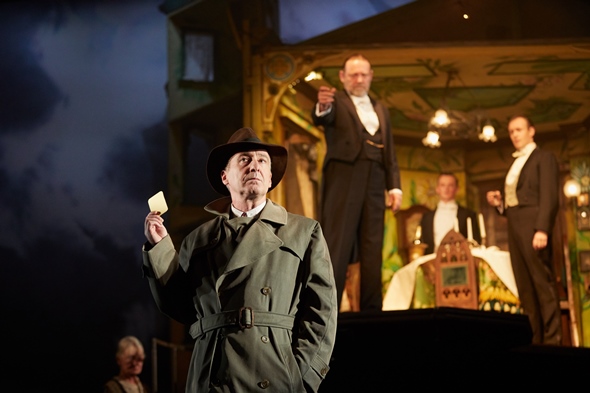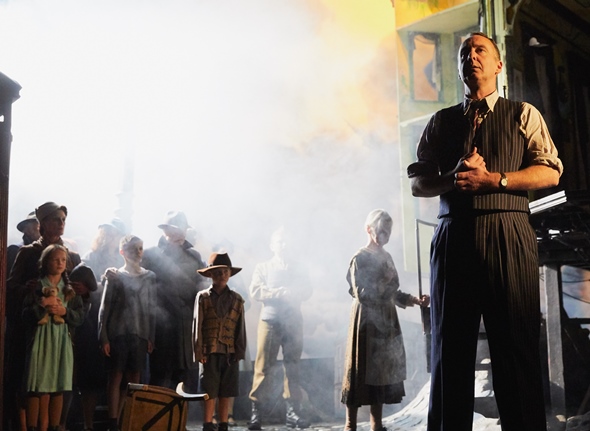‘An Inspector Calls’ at Chicago Shakespeare: High above earthy folk, fine hems betray mud

Guilt runs in the Birling family: father Arthur (Jeff Harmer), son Eric (Hamish Riddle) and mother Sybil (Christine Kavanagh). (Production photos by Mark Douet)
Review: “An Inspector Calls” by JB Priestley, produced by Britain’s National Theatre at Chicago Shakespeare Theater through March 10. ★★★★★
By Lawrence B. Johnson
You have a couple of weeks yet to catch JB Priestley’s classic “An Inspector Calls,” in the National Theatre of Britain production at Chicago Shakespeare Theater. If you harbor any interest at all in stagecraft, put this one at the top of your must-see list. It is a masterpiece of ensemble acting wrapped in a brilliant concept. Priestley’s noir thriller as morality tale has been around for seven decades, and was made into a film in 1954, but Stephen Daldry’s laser-focused staging makes it feel deliciously fresh, newly and wickedly biting.

Siblings Eric and Sheila Birling (Hamish Riddle and Lianne Harvey) embrace the wrong they’ve done to an innocent woman.
The set designed by Ian MacNeil brought forcibly to mind Bruce Springsteen’s song “Mansion on the Hill.” The privileged Birlings occupy a mighty fine home above the huddled masses. Patriarch Arthur Birling is a captain of industry, an exemplary fellow of the realm who appears to be on the cusp of knighthood. His daughter Sheila, a princess in all but title, is about to enter a sensible marriage to Gerald Croft, another upstanding man of business. In fact, we meet the whole lot of them during an engagement party in their dining room.
Actually, it doesn’t happen quite that way in Daldry’s take on the play. First, we encounter some common street urchins splashing about on a rainy night below the Birling mansion. And then we meet the Birlings; actually, not even then. We can see them through the windows of their safely buttoned-up residence and hear them burbling merrily and proudly about the forthcoming union. We don’t really meet them until the men emerge onto a portico for port and cigars, and then the whole front of the house swings open, like great double doors, to allow us into the family’s general presence. Us, and the newly arrived Inspector Goole, who’s investigating the circumstances surrounding the suicide of a young woman.
Goole, played with dry wit and imperturbable purpose by Liam Brennan, comes bearing a photo of the unfortunate woman. He’s curious as to whether any of the Birlings might have known her. But he will show the photo to only one person at a time, starting with the immediately importuned Arthur Birling himself (the arch, imperious Jeff Harmer). Hmm. Perhaps he does recall her – a pretty young woman who worked in his factory, but who made such a clamor asking for a raise that he had no choice but to dismiss her. He pays the going rate and it’s incumbent upon him to maintain fiscal responsibility. But so what? Surely the inspector doesn’t hold him accountable for the poor woman’s death.
The inspector is just getting started, and in a twinkling, the fine folk in the mansion on the hill find themselves down at ground level with the inspector – in the indiscriminate mud of real life. The hem of the bride-to-be’s gown gets soiled, though the ancient maid (91-year-old actress Diana Payne-Myers) hustles a plank to protect the grand dame Mrs. Birling’s clothes, and provides her a chair.

While the Birlings party in their lofty, buttoned-up home, street children play in the falling rain.
Throughout the circulating interrogation that follows, we discover connections between each member of the family and the deceased woman. All the while, Harmer’s indignant Arthur Birling bellows his objections at Brennan’s ever-patient, unswerving Goole. It seems the deceased went by two different names: One moniker or the other stirs recognition as Goole turns his inquiry, with privately shown photo, from one Birling to the next, and indeed to the prospective groom (Andrew Macklin), who seemingly got to know the lady rather well.
Both her eminence Mrs. Birling (the splendidly haughty Christine Kavanagh) and daughter Sheila (Lianne Harvey) acknowledge their nefarious parts in the woman’s sad fortune. The difference now is that whereas Mrs. Birling stands by her rather unfeeling action, the daughter expresses regret and begins to see the moral wrong done by them all – including her inebriate brother Eric (Hamish Riddle), who shares in her remorse.
Essentially, that’s it. This somewhat heavy-handed parable is ended. The inspector withdraws, leaving the Birlings in the mud to contemplate their sins. And yet, maybe this doesn’t all add up: The Birlings aren’t dummies. They begin to see cracks in the case. How do they know this guy was an inspector at all? And what about that photograph – or was it more than one? None of this has really proved anything. There’s no certifiable guilt here. They’ve been had. Simple as that.
Perhaps you’ve seen the play and know the rest. If not, you’re in for a marvelous surprise. The tale unfolds in a space CST calls The Yard. But for the next several nights, one might think of it as the Twilight Zone.
Related Link:
- Performance location, dates and times: Details at TheatreInChicago.com
Tags: JB Priestley, Liam Brennan, National Theatre, Stephen Daldry



